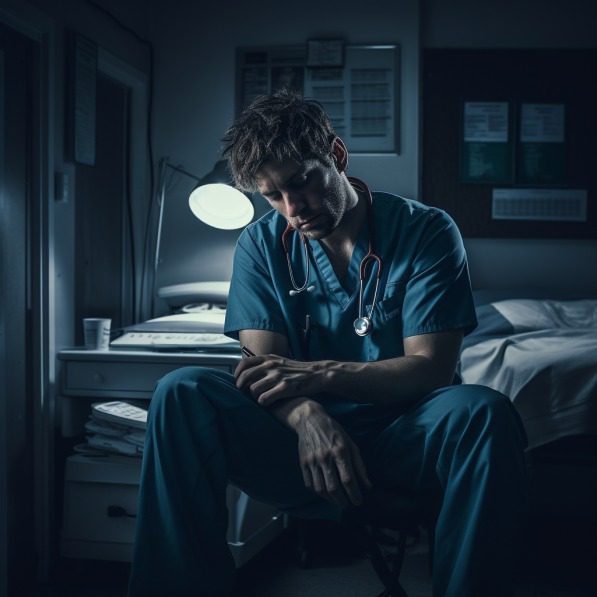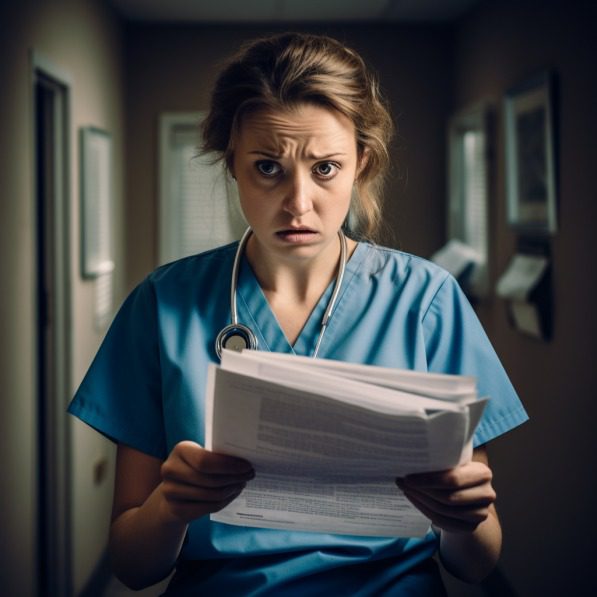Table of Contents


Oh, our brilliant nurses, I don’t know where half of us would be without you wonderful bunch.
Dead probably.
Since you are the backbone of the medical world, it’s surprising how tight our government is when it comes to paying you what you’re worth – but we won’t delve into that too deeply right now because if I start, I don’t reckon I’ll be able to stop myself.
I can’t pay you more or swindle you a rock-star salary deal, but I can make sure you get paid if you get sick.
Sounds good?
Since you spend your life caring for the sick, I’m sure you forget all about yourselves.
What do you do if you get sick?
Who looks after you?
What would happen if you couldn’t work long term (think years)
It’s a fecking scary thought, especially if you have no backup plan.
I’m sure you’d like a safety net should you be the one who ends up in a hospital bed.
And from January 2024, the government has got your back!
Yeah right, you’re now entitled to a whole five days of statutory sick pay per year.

I mean, where do they even pull these numbers from?
If you get hit with a nasty bout of the flu, you will be down and out for more than three days.
A long-term illness or a nasty accident will take you out of the workforce for many months, years or forever.
But, I digress, back to our wonderful nurses.
If you work for the HSE, your standard sick pay is three months full pay and three months of half pay.


If you’re out for longer than six months, you will get an illness benefit of just €220 per week.
The average nursing salary in Ireland is €44,401 or €853 per week.
Could you survive on less than a quarter of that?
If you’re a nurse in the private sector, you should check the T&Cs of your employment but don’t be surprised to find you have no sick pay entitlements.


You spend most of your days, nights, Christmas’, New Year’s, and god knows what else running yourself ragged.
Before too long, your mental health takes a dive or your back pain curls you up in a sweaty ball on the floor, and you can’t continue working as a nurse.
This is where income protection insurance comes to the rescue.
Like a shiny knight on a blinding white mare, salary protection helps pay all your big bad bills.
Because those people with their hands out don’t care what your situation is, they want to get paid.
Mortgage, electric, food, gas, oil, petrol, doctor’s bills, medication, gluten-free kibble for Princess the Cockapoo (she has a sensitive stomach, you see).
The list is damn near endless.
It won’t go away, even if you have to take long-term illness-related leave from work.
You need to ensure income continuance to keep up with these bills.
An income protection policy is just the thing.
But what on earth is income protection?
And how much wonga can you get?
Firstly, you’ve probably noticed how I’m using income and salary protection interchangeably.
Don’t worry; it’s the same animal, just a different name.
Let’s get into it.
What do you need to know about income protection?
Income protection is easy enough to get your mitts on.
If you want to save some time and get the best deal, you should use a specialist income protection advisor 💅
You could do it all yourself, but I feel we’d be great pals, and you wouldn’t want to miss out on the friendship of a lifetime, right?
Riiiiight??
All you need to do is give me some details on this here questionnaire, not dissimilar to the info you use for your Tinder profile.

Your name, your age, your social habits, your medical history.
OK, so that last one, you’re unlikely to tell a potential beau, but your potential income protection insurance provider wants to know all that.
This medical quesitons help me figure out how much your premiums will be, and as tempted as you may be, I highly advise against telling any porky pies here.
Oooh, this is the fun bit.
Let’s return to the nurse earning €44,401 – we’ll call her Annie.
Hello Annie
OK, with the niceties out of the way, let’s see what Annie gets from her income protection policy if she cannot do her job for over six months.
She can guarantee a replacement income (including state illness benefit) of up to 75% of her salary, meaning she will get €11,440 from the government and the rest from her income protection provider.
You want cold hard numbers; I hear you; these ones are just out of the freezer 👌
€44,401 x 75% = €33,000 is the maximum income Annie can get from the state and her income protection provider.
The State illness benefit is €11,440
Income protection will be €21,560
So if she can’t do her job for more than six months, Annie will get a total of €33,000 annually from the insurer and the state.
She will continue to get paid by the insurer until she turns a ripe 65 or until she returns to her job AS A NURSE.
In caps because this is UBER important.
If Annie was well enough to get back to some job but chose not to, that’s fine – the insurer will continue to pay her.
Clearly, if she is well enough to get back to work as a nurse but decides not to, well, then the insurer will stop paying her claim.
The providers are fair, but they’re insurers, not a charity.
Income protection is a gem because it covers ANY illness or accident that stops you from doing your job.
This is different from serious illness cover, which covers a specific number of illnesses.
Mint, eh?
See how that could help you, my nursing friend.
Hello Annie ?
Yeah, Nick, what now?
Jaysus, I better not ask Annie her age so let’s say she’s 38 and a non-smoker:
Quote Type: Income Protection
First Person: Non-Smoker, born on 18/01/1984
Cover Amount: €21,560 per year until age 65.
Occupation Class: Nurse (Hospital) (Class 3)
Deferred Period: 26 weeks
Premium: €79
after tax relief: €47
So Annie will pay €79 per month and claim tax relief annually, giving a net cost of €47 per month.
Less than €50 per month to insure €21,560 per year.
That seems more than fair.
The younger you jump on the salary protection bandwagon, the cheaper your premium will be.
So, your premiums will be lower if you’re younger than Annie.
If you’re older than Annie, you’ll pay more – but you’ll pay even more next year if you put it off.
If you smoke, quit those bad boys!
Because smokers pay extra and die younger, a pretty shit combination.
If you’re overweight, you’ll pay more, I’m sorry!
But if your BMI is 34 and you can get it down to 31, you’ll save a fortune.
Extending the deferral period is another way of reducing your income protection premiums.
“What the hell is a deferral period?” I hear you cry.
In plain English, a deferral is how long you need to be unable to work before youre policy kicks in.
The longer you hold out, the cheaper your premium will be.
Finally, your job title affects how much you will pay.
A nurse in a hospital or a psychiatric nurse is a Class 3 risk.
If you are a Clinical Nurse Specialist or a Clinical Nurse Manager (CNM 2 or 3), you will pay less than Annie as those occupations fall into a lower-risk class 2.
I’m not too fond of the word cheap so let’s look at the best value or most affordable income protection.
That would be Wage Protector from Aviva.


If you leave nursing, you can take your personal policy to your new job.
So even if you have to leave nursing due to a specific health issue, that issue will still be covered in your new job – by your old policy.
The minute you leave nursing, the group scheme policy will end, so you’ll have to reapply and disclose any new health issues making it harder to get income protection.
Irish Life underwrites the SIPTU scheme so you can’t choose your insurer.
Should you go for a personal policy, you can choose from Aviva, Irish Life, New Ireland, Royal London or Zurich Life.
This is especially important if you have a health issue that may be underwritten more favourably at a different insurer to avoid exclusion for that condition.
Aviva has retraining and rehabilitation benefits that are unmatched in the market, making them our preferred income protection provider.
Here’s how we compare income protection providers.
That was a humdinger of a blog; I hope there’s a lot of useful info there for you.
Income protection is a must-have for everyone.
It is the foundation of any solid financial plan.
It’s more important than life insurance, savings, and even your pension because if your income stops, you won’t be able to pay for any of those.
Imagine the peace of mind knowing you’ll be financially ok regardless of your health.
That’s what income protection offers you!
So, complete this questionnaire if you’d like my help.
I’m here, just twiddling my thumbs, waiting for it to arrive in my inbox so I can save you a boatload of time and money and give you the peace of mind you deserve.


Thanks for reading
Nick
Income Protection Specialist @ lion.ie
As Ireland's leading life insurance broker, we specialise in comparing the rates and policies from the top five Irish life insurance providers and offering the very best value quotes to suit the individual needs of our clients. Our expertise lies in finding a suitable insurance plan for those with specific needs, be it a particular illness, occupation or claim history, we've got you covered in every sense!
Watch our video